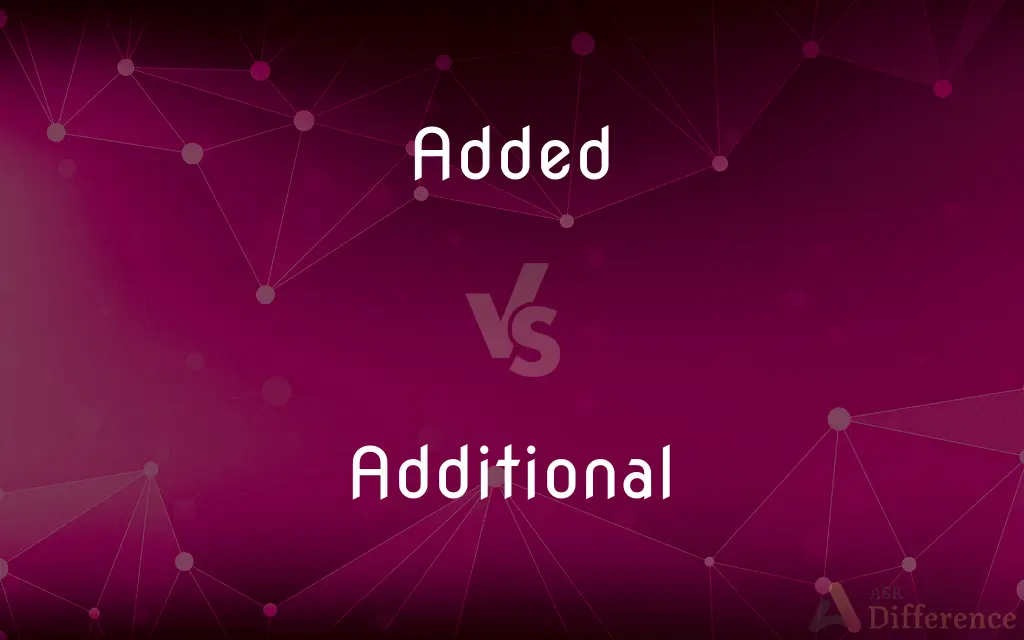Added vs. Additional — What's the Difference?
Edited by Tayyaba Rehman — By Fiza Rafique — Updated on March 19, 2024
"Added" refers to the act of including something extra, whereas "additional" describes something extra that is or may be included.

Difference Between Added and Additional
Table of Contents
ADVERTISEMENT
Key Differences
"Added" implies an action or process, focusing on the inclusion or incorporation of something extra to what already exists. It emphasizes the act of increasing the quantity, enhancing the quality, or introducing new elements to a situation or object. For example, in cooking, ingredients are added to a recipe to create the final dish. On the other hand, "additional" is descriptive, characterizing items, amounts, or conditions that supplement or extend what is already present. It suggests that there is more beyond the original or expected, without specifying the action of adding.
When discussing features of a product, "added features" suggests that these features were not originally part of the product but have been included through an update or enhancement. Conversely, "additional features" may refer to extra options that are available beyond the standard offerings, possibly at extra cost or as part of an upgrade package.
In a project management context, "added" can describe tasks or components that have been introduced into the project scope, implying changes or expansions to the original plan. "Additional," however, often refers to supplementary resources, time, or budget allocations that are available for use if necessary, indicating preparedness for unforeseen needs.
Regarding financial transactions, "added" could refer to fees or charges that have been applied to a bill or account, emphasizing the action of inclusion. "Additional" is used to describe extra costs or potential expenses that may be incurred, highlighting the concept of excess or surplus.
In communication, "added" might be used to describe information or comments introduced into a discussion, contributing to the depth or breadth of the conversation. "Additional" information, however, suggests that there is further detail or more data available beyond what has been initially provided, offering an opportunity for expansion or clarification.
ADVERTISEMENT
Comparison Chart
Definition
Refers to the act of including something extra.
Describes something extra that is or may be included.
Focus
The action of incorporation or increase.
The state of being supplementary or extra.
Usage Context
Enhancements, updates, inclusion in a set.
Supplementary options, resources, costs.
Example
Added ingredients in a recipe.
Additional features of a software package.
Implication
Emphasizes change or contribution.
Highlights availability or possibility of more.
Compare with Definitions
Added
Included or joined to something else.
Sugar was added to the tea to sweeten it.
Additional
Extra or more than what was originally planned or expected.
Additional time is needed to finish the project.
Added
Resulting from an addition.
The added sum of the expenses exceeded the budget.
Additional
Serving as a supplement.
An additional volume was published to include recent discoveries.
Added
Reflecting a direct incorporation.
The newly added chapter expands the book's scope.
Additional
Optional or available for a fuller experience.
Additional toppings for the pizza are available upon request.
Added
Introduced to enhance or complete.
An added feature in the software improves usability.
Additional
Beyond the basic or required.
Additional charges apply for expedited shipping.
Added
Integrated within an existing structure.
Added security protocols were implemented last month.
Additional
Enhancing or extending something existing.
Additional exercises at the end of the chapter test comprehension.
Added
To join or combine (numbers) through addition
If you add 5 and 10 and 17, the result is 32. If you add 6 to 8, you get 14.
Additional
The operation that, for positive integers, consists of increasing by a definite number of increments of 1. The operation is extended to other numbers according to the additive properties of positive integers and other algebraic properties.
Added
To join or unite so as to increase in size, quantity, quality, or scope
Added 12 inches to the deck.
Flowers that added beauty to the dinner table.
Additional
Any of certain analogous operations involving mathematical objects other than numbers.
Added
To say or write further.
Additional
The process of adding or joining something to something else, typically to make it larger
The addition of a porch to the house would increase its resale value.
Added
To find a sum in arithmetic.
Additional
Something added
This painting would make a fine addition to the museum's collection.
Added
To constitute an addition
An exploit that will add to her reputation.
Additional
Supplemental or added to something.
Added
To create or make an addition
Gradually added to my meager savings.
Additional
Something added.
Added
Simple past tense and past participle of add
Additional
Added; supplemental; in the way of an addition.
Added
Being in addition [to something else]
Additional
Something added.
Added
Combined or joined to increase in size or quantity or scope;
Takes on added significance
An added attraction
Additional
Existing or coming by way of addition;
An additional problem
Further information
There will be further delays
Took more time
Additional
Added to complete or make up a deficiency;
Produced supplementary volumes
Additional reading
Additional
Further or added;
Called for additional troops
Need extra help
An extra pair of shoes
I have no other shoes
There are other possibilities
Additional
More;
Would you like anything else?
I have nothing else to say
Additional
One more or an added;
Another chance
Another cup of coffee
An additional piece of pie
Common Curiosities
In what context might "added" be preferred over "additional"?
"Added" is preferred when highlighting the action of including something or the direct result of that action, such as adding features to a product.
What does "additional" imply in terms of quantity or quality?
"Additional" implies an increase in quantity or an enhancement in quality, offering more than what was initially available or required.
What is the difference between "added" and "additional"?
"Added" focuses on the act of inclusion, while "additional" implies something extra or beyond what is standard or expected.
Can "added" and "additional" be used interchangeably?
While they can sometimes be used in similar contexts, their nuances mean they are not always interchangeable, as "added" emphasizes the action of adding, and "additional" focuses on the concept of extra.
When is "additional" the more appropriate term to use?
"Additional" is more appropriate when referring to extra elements or supplements that are not part of the original, such as additional resources or time.
Can something be both "added" and "additional"?
Yes, an element can be both if it is newly included (added) and serves to provide extra functionality or value (additional) beyond the original scope.
How do "added" and "additional" impact the understanding of instructions or documentation?
Their usage can clarify whether something is a direct inclusion ("added") or an optional or necessary supplement ("additional") to the original content or requirements.
What role does context play in determining the use of "added" vs. "additional"?
Context is crucial; "added" focuses on the process of adding, while "additional" implies the presence of extras, with each term fitting scenarios that emphasize these different aspects.
How does "added" relate to the concept of inclusion?
"Added" directly relates to including or integrating something into an existing set, emphasizing incorporation.
How do "added" and "additional" reflect on the concept of value?
"Added" can suggest direct enhancement from inclusion, while "additional" often implies added value or necessity, enriching or extending the original set or concept.
Share Your Discovery

Previous Comparison
Blush vs. Laugh
Next Comparison
Milliamp vs. AmpAuthor Spotlight
Written by
Fiza RafiqueFiza Rafique is a skilled content writer at AskDifference.com, where she meticulously refines and enhances written pieces. Drawing from her vast editorial expertise, Fiza ensures clarity, accuracy, and precision in every article. Passionate about language, she continually seeks to elevate the quality of content for readers worldwide.
Edited by
Tayyaba RehmanTayyaba Rehman is a distinguished writer, currently serving as a primary contributor to askdifference.com. As a researcher in semantics and etymology, Tayyaba's passion for the complexity of languages and their distinctions has found a perfect home on the platform. Tayyaba delves into the intricacies of language, distinguishing between commonly confused words and phrases, thereby providing clarity for readers worldwide.
















































